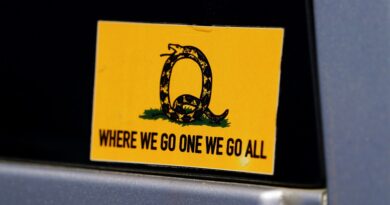A QAnon ‘Digital Soldier’ Marches On, Undeterred by Theory’s Unraveling

Despite these delusions, Ms. Gilbert — a self-described mystic who has written four books, with titles like “Swami Soup” — mostly struck me as a New Age eccentric who could use some time away from screens. She disdains the mainstream media, but she agreed to be profiled, and we kept in touch.
Over a series of conversations, I learned that she had a longstanding suspicion of elites dating back to her Harvard days, when she felt out of place among people she considered snobby rich kids. As an adult, she joined the anti-establishment left, advocating animal rights and supporting the Standing Rock oil pipeline protests. She admired the hacktivist group Anonymous, and looked up to whistle-blowers like Julian Assange and Edward Snowden. She was a registered Democrat for most of her life, but she voted for Jill Stein, the Green Party candidate, in the 2016 presidential election after deciding that both major parties were corrupt.
Ms. Gilbert’s path to QAnon began in 2016 when WikiLeaks posted a trove of hacked emails from the Clinton campaign. Shortly after, she started seeing posts on social media about something called #Pizzagate. She had dabbled in conspiracy theories before, but Pizzagate — which falsely posited that powerful Democrats were running a child sex-trafficking ring out of a Washington pizza parlor, and that all of this was detailed in code in the Clinton emails — blew her mind. If it was true, she thought, it would connect all of her suspicions about elites, and explain the horrible truths they had been covering up.
“The world opened up in Technicolor for me,” she said. “It was like the Matrix — everything just started to download.”
Pizzagate primed Ms. Gilbert for QAnon, which she discovered through the YouTube videos of a British psychic. It quickly took over her life, and yanked her politics sharply to the right. Seemingly overnight, her Facebook feed switched from Change.org petitions and cute animal photos to Gateway Pundit links and “Killary Clinton” memes.
Like many QAnon die-hards, Ms. Gilbert has a purely virtual attachment to the movement. She said she had never attended a QAnon rally, or even met another QAnon believer in person. She works from home as a freelance audiobook narrator, rarely leaves her apartment and scoffed when I asked if she would ever take up arms for Q.
“I am a digital soldier,” she said. “I work through the computer.”
She was not at the Capitol riot, and she denied that QAnon was a violent movement. She said there was no proof that the participants were QAnon believers, and suggested that they might have been antifa activists in disguise — all things that have been widely debunked. She sounded frustrated that Mr. Biden had been certified as the winner of the election — something Q had never predicted — but she said it hadn’t shaken her faith.
*** This article has been archived for your research. The original version from The New York Times can be found here ***


